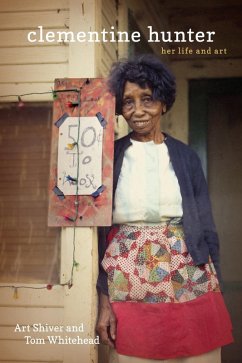Clementine Hunter (1887--1988) painted every day from the 1930s until several days before her death at age 101. As a cook and domestic servant at Louisiana's Melrose Plantation, she painted on hundreds of objects available around her -- glass snuff bottles, discarded roofing shingles, ironing boards -- as well as on canvas. She produced between five and ten thousand paintings, including her most ambitious work, the African House Murals. Scenes of cotton planting and harvesting, washdays, weddings, baptisms, funerals, Saturday night revelry, and zinnias depict experiences of everyday plantation life along the Cane River. More than a personal record of Hunter's life, her paintings also reflect the social, material, and cultural aspects of the area's larger African American community. Drawing on archival research, interviews, personal files, and a close relationship with the artist, Art Shiver and Tom Whitehead offer the first comprehensive biography of this self-taught painter, who attracted the attention of the world. Shiver and Whitehead trace Hunter's childhood, her encounters at Melrose with artists and writers, such as Alberta Kinsey and Lyle Saxon, and the role played by eccentric François Mignon, who encouraged and promoted her art. The authors include rare paintings and photographs to illustrate Hunter's creative process and discuss the evolution of her style. The book also highlights Hunter's impact on the modern art world and provides insight into a decades-long forgery operation that Tom Whitehead helped uncover. This recent attention reinforced the uniqueness of Hunter's art and confirmed her place in the international art community, which continues to be inspired by the life and work of Clementine Hunter.
Dieser Download kann aus rechtlichen Gründen nur mit Rechnungsadresse in A, D ausgeliefert werden.









